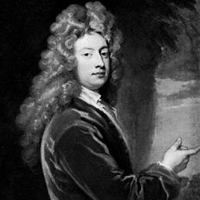Licentiousness and Superficiality in The Way of the World
A charge of immorality and superficiality has been brought against restoration comedy primarily because of its portrayal of Hobbesian view of life and the absence of philosophical and psychological depth. Man is shown to be in pursuit of insatiable desires. Pursuit of money and sexual pleasure is the main concern of the characters presented. Love and marriage are dealt with as mercenary ventures.

William Congreve (1670-1729)
Restoration drama had to depict the contemporary times. There was a moneyed class with a search for pleasure. Money became the main concern of the people. Marriage was not just looked at as an institution for procreation or for the idea of providing stability in social life, it was judged in mercenary terms. There was a relentless pursuit of sexual pleasure. It was used as a means to earn money. The drama of the time also presents characters who are after these things. Nobody is a paragon of beauty among restoration characters. For these reasons restoration comedy is criticized on moral grounds. Even the protagonist is not a morally upright person. The integrity of this central character is questionable. The characters are involved in many wild and vulgar activities. It could be natural for people to do so while passing through youth, but in the characters of restoration comedy this process is extended too much. Even after marriage, they continue doing the same thing which they had been doing before marriage. In moral terms the readers may feel superior to the characters in the play. The Way of The World has characters reflect these features. Mirabell, the major character of the play, loves Millamant but behind his love there is a desire for fortune hunting. He had many women in his company. He uses Mr. Marwood and Mrs. Fainall for the satisfaction of his desires and abandons them to avoid difficulties. He pretends to love Lady Wishfort only to move closer to Millamant. Lady Wishfort also searches for husbands at fifty five. Mr. Fainall agrees to marry lady Wishfort's contaminated daughter not because he loves her, but because he is after money. This adulterous relation and judgment of love and marriage in terms of money helps to justify the charge of immorality brought against the play.
Restoration comedy of manners was designed to satirize the behavior of the aristocracy. These plays were superficial and lacked vision, range, insights and philosophy. These were serious deficiencies. These plays wanted to make up for this lack by spectacle and themes that are hard to accept. These dramatists indulge in sensationalism. Instead of arousing serious feelings these plays arouse feelings of disgust. So these plays are brilliant at the surface, but are rotten at the core. Neither do these plays give a true picture of contemporary society nor are they documents of art about the society. The characters in The Way of the World are frivolous. There is no genuine relationship between and among them. They fail to develop lasting relationships. Love and marriage are taken light heartedly. The artificial language they use is a reflection of the artificial values by which they live.
Therefore, the charge that restoration comedy is licentious and superficial is justified as the plays of the period deal with adultery, commercialized love and marriage and lack philosophical and psychological depth. The unnatural language highlights the superficiality in the relationship.
Center for The Way of the World
Introduction of The Way of the World
Summary of The Way of the World
The Way of the World as Restoration Comedy
 |
bachelorandmaster.com |